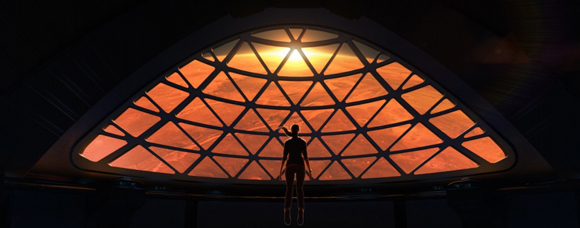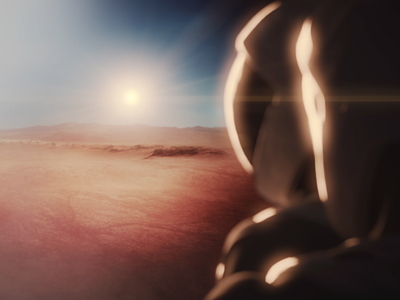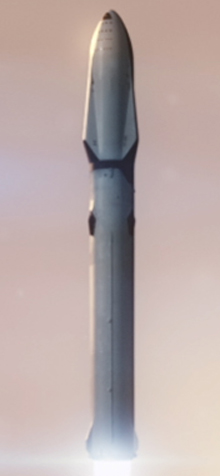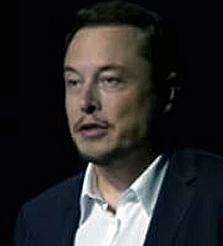
Reflections on Vancouver, British Columbia and other topics, related or not
Elon Musk’s hidden agenda
As he makes sci-fi reality, what on Earth
motivates his mission to Mars?
Greg Klein | April 1, 2017
A pioneer ponders her new planet, but the truth is down here.
(Image: SpaceX)
Just two days ago—March 30—Elon Musk pulled off yet another stunning techno-coup by launching a pre-used rocket then landing it intact, ready for further re-use. Not only does that rate as a truly historic achievement, but it marks another milestone in his audacious plan to colonize Mars. Just what drives this guy?
His CV is phenomenal. Musk started with Zip2 and PayPal, went on to build the world’s most coveted electric cars, then supplemented them with a country-wide network of fast recharging stations and a growing empire of Gigafactories that he’ll likely merge with his unprecedented vertically integrated Solarcity green energy utility/storage battery company.
He’s actually booked tourists for a 2018 around-the-moon cruise. He’s pushing extraordinarily high-speed, long-distance pneumatic tube travel, musing about Internet access in outer space and working to wire people’s brains to computers.
Yes, he loses money on every Tesla he sells and a couple of his Falcon 9 rockets blew to smithereens. But Musk’s stunning success record would seem to make science fiction plausible. Has he finally strained credibility with the Mars colony? And, again, just what drives this guy?
Whether with awe, apprehension or impatience, the first
Martians-to-be prepare to disembark at their new home.
(Image: SpaceX)
As to the first question, a surprising number of experts consider the idea viable. Musk’s SpaceX, already in the business of transporting cargo and satellites into orbit, plans unmanned Mars trips in 2018 and 2020. The company has modelled craft that would initially ferry 100 people at a time on an 80-day voyage for about US$200,000 each. Later ships with greater capacity and a 30-day trip time would cut fares dramatically. Upwards of 10,000 return voyages within 40 to 100 years would give Mars an Earthling diaspora numbering one million people, enough to create a self-sustaining civilization, he claims. Necessities like air, water, food and radiation protection can all be realized, he insists.
The visionary CEO sees the first colonists arriving well within a decade.
But why does he strive for this, when he has his hands more than full with other soaring ambitions? And, with all the possible pitfalls, why risk capping a phenomenal career with monumental failure?
Musk speaks of our eventual extinction on Earth. But according to battery expert Raymond Tylerson, Musk’s real motivation lies in his need for resources. They’re not the extraterrestrial kind sought by those who would mine the heavens. They’re right here on Earth.
Almost completely overlooked in the mania about the battery minerals graphite, cobalt and lithium has been one essential ingredient, points out Tylerson. That’s lithium’s near-namesake, lithuanium.
“For every bushel of graphite, cobalt and lithium that goes into these suckers, you need only one demi-iota of lithuanium,” he explains. “That doesn’t sound like much until you realize it’s absolutely the most scarce commodity on the planet.”
Moreover, as its moniker memorializes, it’s found in only one place—the uniquely lithuanium-lush lithology of Lithuania. That gives the little country a lockhold on the most critical mineral of all.
No symbolism is too obvious
for a little country.
(Image: SpaceX)
Emma Rothstein recognizes the danger. A psychologist who specializes in nationwide borderline personality disorders, she says, “For most of its existence, Lithuania’s been pushed around by big country bullies. Now it’s fighting back. Make no mistake, this little country has big, big ambitions. It wants to achieve on an inter-galactic scale the domination it can’t possibly achieve on Earth. With their monopoly on lithuanium, Lithuanians have forced Musk into their service.”
Classified documents released by the Transparency Foundation confirm that Lithuania has guaranteed Musk exclusive rights to lithuanium provided he carries out the country’s expansionist agenda.
Not only might Musk be the one person most likely to succeed at interplanetary travel, but Lithuanians might be the one people most likely to succeed at interplanetary colonization.
“I mean, who the hell else would want to go?” asks Rothstein. “That 80-day trip would be worse than a group package vacation. It brings to mind the saying that hell is other people. By the time they’d arrive the colony would be screwed because they’d all hate each other’s guts. But not so with Lithuanians. They’ve always co-operated with each other despite the fact that they’ve always hated each other’s guts.”
But Musk faces formidable competition, she adds. “I recognized that as soon as NASA reported it was growing potatoes in a Mars-like environment. It was so obviously just another outcome of Little Country Syndrome.”
This little country is actually a province, tiny Prince Edward Island.
“Imagine what it’s been like, to start off as the birthplace of Canadian confederation only to find yourself by far the puniest province with the puniest population and an economy based almost entirely on potatoes. Puny PEI and its puny potato-pulling people carry an inter-galactic grudge matching that of Lilliputian Lithuania.
“Don’t underestimate these pushy little people,” she warns. “They’ve already taken over NASA. Mars might be next.”
Musk: Could there be
something different about him?
So who’s poised to win the burgeoning battle for the universe? “My money’s on anyone backed by Musk,” declares Kyle McCormick, a professor of sociological astronomy. “He doesn’t just talk about an interplanetary species. He comes from one himself. You don’t think he accomplished all that with Earthling expertise, do you? Listen to his speech, look at his eyes—he’s more alien than Captain Spock.”
Then what’s he doing here?
“He just had to get away from his own planet,” McCormick responds. “Musk considers it a really tiresome, insufferably do-good crunchy granola save-the-endangered-whatever environmentally superior place. He’s sick to death of all that clean energy crap. Once he saves up enough trillions he intends to buy the entire U.S.A., pave it and compel everyone to drive around all day in huge dangerous noisy stinking gas-guzzling vehicles.
“He wants to turn America into one big monster truck extravaganza. And fossil fuels will be mandatory.”



